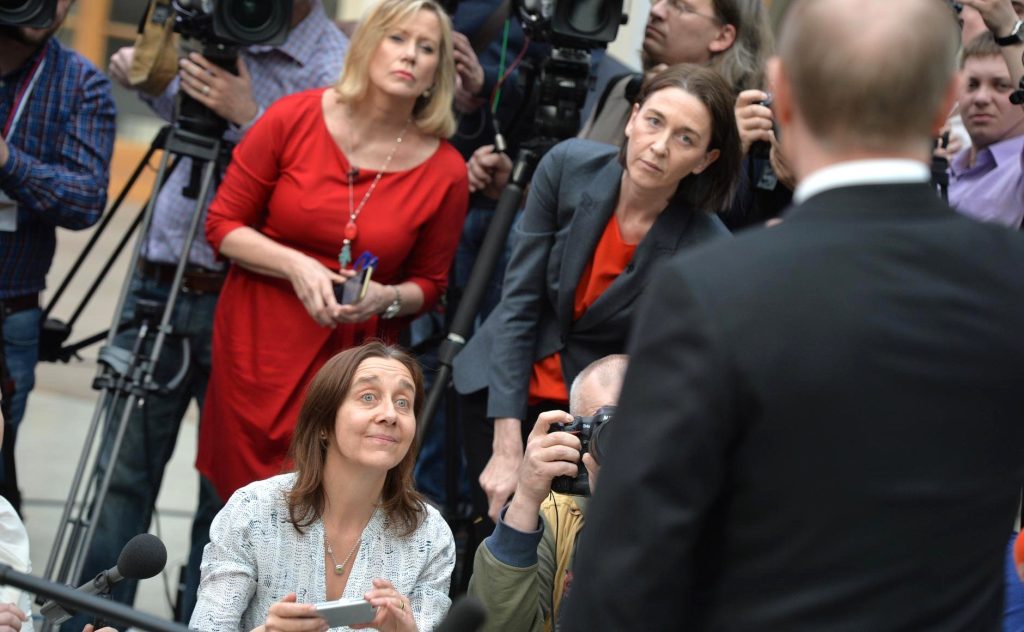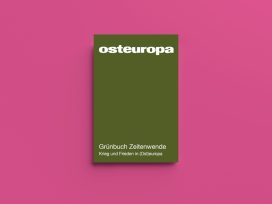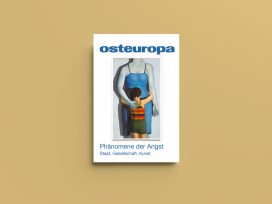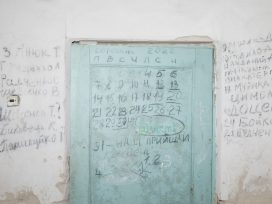Our dear friends in Moscow
An interview with Irina Borogan and Andrei Soldatov
Putin’s crack-down on dissent at the beginning of his third term was a watershed moment for Russian journalism. While the majority of critical reporters were forced to leave, those that remained morphed into regime propagandists. How to explain their political subservience?
Russian investigative journalists Andrei Soldatov and Irina Borogan speak to former journalist and war reporter Mirjana Tomić about their new book, Our Dear Friends in Moscow: The Inside Story of a Broken Generation.
Mirjana Tomić: You were both born in Moscow, about 50 years ago. You’re both investigative journalists, specializing in the Russian security services. You met while working on the newspaper Segodnya (Today) and have stayed together as partners and collaborators ever since.
This was about 25 years ago, when Vladimir Putin became Russia’s president for the first time. You are co-founders of agentura.ru, which monitors the Russian security services. Together and separately, you have covered major Russian tragedies and events, from the Dubrovka theatre hostage crisis and the Beslan school siege to protests in 2010 and 2011.
Moscow officialdom lied about the number of victims and concealed rescue-operation mistakes. Some of your then colleagues were already willing not to tell the truth of what happened – a long time before the escalation of war in Ukraine in February 2022. I would also like to remind the audience that the designation of ‘foreign agent’ began in 2012.

Image: www.kremlin.ru / Source: Wikimedia Commons
Irina, you also covered foreign wars, including NATO’s bombardment of Yugoslavia. Both of you worked for various media in Moscow. The FSB (Russia’s Federal Security Service) tracked your work and interrogated you. Irina, you were proclaimed a ‘foreign agent’ in September 2025 and Andrei, you, two years earlier. You are both now on the most-wanted list. And, since 2021, you have lived in London; it was not your choice to leave Russia and settle abroad.
Our Dear Friends in Moscow tells an inside story, describing how some of your fellow journalists in Russia came to accept Vladimir Putin’s government and support the war. The book begins in the first years of Vladimir Putin’s presidency when you were working for Segodnya and then moves to your time in exile.
It describes both a personal history and the trajectory of a group of highly educated, multilingual, well-travelled journalists, who spent the first part of their professional lives as critical journalists and then became propagandists. Could you introduce the main characters in your book and explain why you chose them?
Andrei Soldatov: Our Dear Friends in Moscow is different from our previous books. It’s much more personal, and for a good reason. We started thinking about writing it immediately after the beginning of the full-scale invasion in Ukraine. We wanted to find an answer as to why so many people in Russia – and we’re not talking about ordinary people brainwashed by propaganda but essentially Russian elites – decided to support Putin and the war.
If you’re a scientist or researcher, you can approach this topic by analysing lots of data. But we are journalists, so we wanted to interview a group of people who might help us find the answer to this question.
We ended up thinking about people who used to be our good friends when we started our careers as journalists. We all met at the national newspaper Izvestia in 2000, when Putin had just become president. Then our friendships fell apart around the time of the Moscow protests in 2011–2012. But, for this book, we decided that we needed to reconnect with these people and try to understand their rationale.
So, who are we talking about? Most of us met in Izvestia’s political department. Our boss was Evgeny Krutikov, who always seemed to live in the shadow of his family: his great-grandfather was a deputy prime minister under Stalin, and his father a very prominent Russian – back then Soviet – spy. Krutikov was always fascinated by his family’s story and the Russian intelligence agencies.
Petya Akopov, a very intelligent guy, was a kind of maverick, always obsessed with strange things. He collected North Korean stamps, for example, and has a huge library, mostly containing books on North Korea and China – he knows a lot about these countries.
Akopov’s wife, Marina, was also a very interesting person. We spent a lot of time in their apartment and met Petya’s close friend Zhenya Baranov there. He was a prominent war correspondent, a very brave one who covered the Second Chechen War. We admired him, because he was an excellent journalist.
Later on Baranov introduced all of us to his wife, who was a very liberal and funny woman, also with an interesting Soviet pedigree. Olga Lyubimova, then a TV host, is the great-granddaughter of renowned Russian actor Vasily Kachalov. There is a street named after him in Moscow. Everyone in Russia knows his name because Sergei Yesenin wrote a poem about Kachalov’s dog – it’s a household name. We drank together, spent a lot of time together. But, most importantly, we believed at the time that we were on the same page professionally.
Svetlana Babaeva, though not a close friend, was also someone we spent a lot of time with, because she was also a journalist at Izvestia’s political department. She was what we called a journalist of the presidential pool: part of a group of journalists who always accompanied the president. She started with Yeltsin and then began following Putin, spending a lot of time with him. She was that kind of political animal.
Anyway, we spent a lot of time together, sometimes under very difficult circumstances. We covered terrorist attacks together. We were in Beslan with Baranov and Krutikov. We found ourselves together in Lebanon when the war between Israel and Hezbollah started in 2006. And we believed for many years that, although there were differences between the way we saw the world, professionally we were on the same page. We respected each other.
They supported us when we found ourselves in trouble with the FSB. For instance, Baranov helped us to speak on his TV channel about what we found out about the FSB operation to release hostages in Nord-Ost, which was a disaster. Akopov helped us to publish our big report about changes to the FSB’s counterterrorism tactics following the Beslan disaster. Krutikov helped us with advice and his connections.
But when we eventually split up, it was quite dramatic. I would say that the moment when we understood that we couldn’t talk to one another anymore was during the Moscow protest when Akopov published a list of ‘enemies of the people’. We all understood by 2011 that if you ended up on such a list, you’re in trouble. There was already a list of journalists that had been attacked and killed in Russia. It was already quite long by 2011, and Akopov put our names on that list.
Mirjana Tomić: He reposted the list? Did he write it?
Andrei Soldatov: Yes, he wrote it and reposted it. With our names on the list. It had got so personal that we thought it would be impossible for us to talk. But for the book, we reconnected with most of these people. Only one person refused to talk to us: Baranov’s former wife, who became the Minister of Culture. When I called Lyubimova, she pretended to be her press officer. Akopov and Krutikov agreed to talk to us for hours and hours. The book is a result of these conversations, of what we remember and what we have understood about this 25-year journey that Russia has been through.
Mirjana Tomić: Irina, let’s just go back for a second. You said during one interview that you belonged to a ‘happy generation’. What did you mean by the happy generation? Did you think change was possible in a country that didn’t have a very long democratic tradition, if any? Why were you so optimistic?
Irina Borogan: It’s true that I said we were the first happy generation in twentieth-century Russia, because the century had been so terrible. The whole of Europe went through two world wars, and Russia also experienced the Russian Civil War and Stalin’s repression in between. The only people who were able to start living a normal kind of life were our parents, born after the Second World War. But their lives were limited politically. They couldn’t express themselves in public. They couldn’t discuss politics or talk about many things, like western art and movies. They couldn’t travel abroad. They weren’t allowed to set up businesses. They weren’t allowed to make money. I remember all that from when I was a little girl.
At primary school, I remember that my teachers were formidable. I was always in trouble with them. I didn’t do anything terrible. I didn’t try to set my teacher on fire like my friend did. The maximum I did was to ask them questions, or I tried to discuss something they had said, which was considered a huge sin. And then perestroika happened. When I became a teenager, perestroika was in full bloom. And, step by step, we found out that we were allowed to do anything we wanted.
I mean, nobody paid attention in school to what clothes you were wearing. You could wear makeup. And – what was important for me – listen to western music, watch movies. Everything was coming to Russia every day, literally. For me, it was like we had been living in a black and white movie, and then colour appeared. A liberal principal was hired at my school, which was very important for me. They called him a new democrat, a historian who was happy to talk about everything: history, literature, the gulag, repression, music.
And then came the 1990s. The period was traumatic and painful for older people, like my parents. They lost all their savings. They were engineers and their salaries became insignificant. When the Soviet Union collapsed, I was 16 years old, so I didn’t care a lot about money. I cared about being allowed to do anything I wanted. Night clubs appeared on every corner. Western movies were shown in cinemas. Everything was allowed. My friends who were interested in money set up new businesses, many in their early 20s, or even younger. Those who weren’t interested in being entrepreneurs found jobs with the foreign companies that came to Moscow.
There was a sudden blast of media in the country: lots of newspapers, TV channels. And you could join any of them. It wasn’t quite like in Europe, or in the US. There were, of course, some restrictions. Most independent media were owned by oligarchs. State media were very boring. But if you weren’t interested in liberalism or boring state media, you could also join a crazily nationalistic newspaper – the ‘patriotic papers’, they were called. You wouldn’t be well paid, but they were also an option. So, freedom of expression, the freedom to do whatever you wanted – that was a euphoric feeling for young people.
Mirjana Tomić: To what extent was this euphoria – this atmosphere that you have just described – prevalent in cities like Moscow, St. Petersburg?
Irina Borogan: I know Moscow life very well and am only talking about Moscow. Of course, for my relatives in the Russian provinces, things weren’t the same.
Mirjana Tomić: There’s a sentence in your book where you describe how, in the Soviet Union, the only people who could travel to countries other than, say, Bulgaria, were spies. They were diplomats or important artists. Your protagonists all belong to these categories. You call them ‘an elite’. Did average Russians admire this elite, or did they hate them?
I have the feeling from your previous book, The Compatriots, that spying is a kind of hereditary profession: many spies had children who later became spies, their grandchildren became spies, etc. Could you explain the role of these spies and the security services? Are they seen as a sort of upward-social-mobility ladder?
Andrei Soldatov: It’s a bit more complicated than that. Many Russians, even those from liberal families of artists and journalists, are quite proud of their ancestors who served in Soviet intelligence during the 1930s or 1940s. The traditional Russian elite had either been destroyed or expelled during the Russian Revolution, and a new elite emerged that was very different. They were intellectuals, who were sometimes spy intellectuals. Many of them were ultimately repressed and killed, which created an image of something significant and tragic in the family, leading to a feeling of self-importance in society.
Evgeny Krutikov’s father, for example, had been a young Soviet spy, who had been promoted by his father – Deputy Prime Minister at the time – and assigned to the embassy in France. When Stalin died, things went south for many Soviet spies. There was a rumour, a sense of unease that the new guy – whoever would replace Stalin – would either change the rules of the game or start a new mass repression. This caused a lot of paranoia within Soviet intelligence and many spies defected.
Krutikov’s father was arrested and sent to the gulag – he spent many years there. But when he finally got released, he found a way back to the Russian elites, because of his ancestry, because of his dad, because the family was considered so important.
When I asked Krutikov during our conversations, ‘do you feel yourself and your family to be victims of Stalin’s repressions?’, he said, ‘no, because my father was repressed after Stalin died’. Apparently, for him, this created a strange psychological state whereby he actually felt proud of his family. For Krutikov, it justified Stalin’s actions, because it was Stalin who gave this status to his family. In many elite families in Moscow, people have really mixed feelings about spies. Of course, we also need to understand that the Russian and Soviet intelligence and security services were so huge that you need to identify which part of the security services you’re talking about.
If you’re talking about those who conducted repression in Russia, of course, everybody hated them and were afraid of them. But if we are talking about people who …
Mirjana Tomić: Killed outside the country…?
Andrei Soldatov: Yes. This was the topic of The Compatriots. We tried to understand why Russian foreign intelligence was never reformed. Russian intelligence agencies presented a narrative to the Russian public portraying spies abroad as the most liberal part of the KGB, because they were exposed to the Western world. And it was accepted by Russian society. Even now, if you talk to people, they will say, ‘Yeah, the KGB was bad, but spies were different’.
Mirjana Tomić: Irina, I would like to make a connection between your last two books and the story of some of your protagonists. When I read The Compatriots, one thing that struck me was that people from very different social and economic backgrounds, from different waves of immigration, agreed to cooperate with intelligence. I’m wondering what motivated them. I have the feeling that some of your protagonists who have changed sides, have done the same thing: they have put Russia, ‘my motherland, right or wrong’, above any other values. From what I understand, they haven’t done it for money. They’ve done it out of belief. Could you explain what these beliefs are? Why are they trying to justify the Ukrainian war? You’ve said that yesterday’s liberals now believe that Russia can only be run as a dictatorship.
Irina Borogan: That’s complicated. Most of our main protagonists are a little bit older than us, so their adult life started in the Soviet Union and they already felt nostalgic for those times when we knew them. We, meanwhile, never felt nostalgic for the Soviet Union. It’s not that they love communism or socialism, but they love the superpower status that the Soviet Union had and Russia did not. Partly the motivation for what they’re doing stems from this nostalgia for the status of a superpower. Also, to live in an authoritarian country and be a dissident against the authorities is very hard indeed. It’ll ruin your career. You’ll never be successful, never be rich, or even well off.
Mirjana Tomić: At the beginning of the book, you mentioned how important it is to have access to the Kremlin.
Irina Borogan: To be a successful journalist – and they all started their careers as journalists – you need access to the Kremlin. And to have access to the Kremlin, you need to be on good terms. These are all incredibly ambitious people. They want to be prominent and make their place in history. So they side with the Kremlin. They weren’t like that before. Twenty-five years ago, they weren’t ready to justify mass killings, like those in Chechnya. But they gradually moved to the dark side, pursuing their careers, pursuing the dictator.
Mirjana Tomić: Does this mean that they write things they don’t believe in?
Irina Borogan: They have never been brainwashed, because they are brainwashers themselves. This means that they partly believe what they say. And partly they follow the party line. So, it’s difficult to tell. Because they’re all very pro-war, they should love Igor Girkin, who Putin appointed as the Minister of Defence of the Donetsk People’s Republic. But when Girkin was sent to prison after criticizing Putin, no one said a word to defend him. It would seem that they’re very restricted and limited in what they’re allowed to talk about.
Mirjana Tomić: The fact that I’m originally from Belgrade makes me particularly interested in one of your protagonists: Zhenya Baranov. He is the head of the Ruski Dom, the Russian House in Belgrade. He’s Jewish but converted to the Orthodox church and became very religious. It’s all a bit difficult to understand rationally.
Baranov’s wife, Olga Lyubimova, now ex-wife and the current Minister of Culture, went to Belgrade on vacation and said, ‘Oh, I wish the Russian intelligentsia could understand how they do things in Belgrade’. There are a lot of conspiracy theories. Could you explain why there are these close relations between Baranov and Serbian nationalists?
Andrei Soldatov: To give a proper answer to this question, we need to start with a huge turning point in recent Russian history: the 1998 economic crisis, which was different from any other economic problem that Russia had faced. By the end of the 1990s, a lot of people in Moscow and St. Petersburg had become successful, business-minded people. They had started new careers, spoke many languages, and considered themselves westernized. And then, all of a sudden, they took this huge financial hit and started asking questions like, ‘Why on earth did you tell us that if we accept western rules in our country, we would become successful. We did that, and now we are ruined. We lost all our savings, just like those before us. But you told us that they were the losers, because they were part of the military-industrial complex, because they were stupid Soviet people. But we are different, we are westernized. And you betrayed us yet again.’ And that’s how the conspiracy theories started – that the West was never serious about helping Russia, it was always about cheating. And they just needed to find a way to channel this feeling of grievance and anger. And then came the NATO bombing of Belgrade in 1999.
Irina Borogan: I reported from Belgrade back then and remember that when I got back to Russia, I found a lot of sympathy for the Soviets and a lot of hatred for NATO. That was very common.
Andrei Soldatov: It just clicked into place. Baranov started writing and making his documentaries around 1998–1999. All of a sudden, he had found his audience. After that, it was just a matter of time for him to construct a conspiracy, which already had a foothold in Serbia – that there was a western plot in several stages against Russia and Slavic people.
First, it was about conflicts in the former Soviet Union – most of our protagonists spent time in the breakdown of the Soviet republics of Georgia, South Ossetia and Abkhazia, and had a big emotional attachment to these regions. Then came Serbia. Then Ukraine, the Orange Revolution. And, of course, Georgia again in 2008. Line all these things up, and you get your conspiracy. By the time of the Maidan in 2014, the conspiracy sold to the Russian public was already in place. The tone was already very aggressive. Baranov contributed a lot to conspiracy theories, because he was producing lots of material about Maidan. A new Russian-television language was invented in 2014. It’s a really strange mix of often unconnected elements, united by one thing only: the western conspiracy.
Mirjana Tomić: Exiled journalist Alexey Kovalev recently published an article in which he claims that the West thinks that Russia’s future will be liberal, while the country is getting more nationalistic – for example, ultra-nationalists who heavily criticize corruption in the Russian military (generals stealing and directing different operations) are more nationalist than the current government. Kovalev thinks that the young generation – people who are pro-war – are likely to get even more nationalistic.
Can you see yourself ever being on the same side as the protagonists in your book? Could they change sides and become democrats again? Nikita Mikhalkov, the Russian movie director, once got an Academy Award for his anti-Stalinist film, and now he’s a Putin supporter. People change sides. Can you imagine yourself in the same room with these people again?
Irina Borogan: Mikhalkov is a formidable example, because this guy has changed his opinion several times. He was a pro-communist, who became a democrat, and then became a Putin admirer. He knows no limits. But our protagonists are more honest, I would say. I don’t think they’re such hypocrites. And if Russia was free, there may not be a lot of opportunities to change sides for people who promoted the war.
Andrei Soldatov: I very much hope there wouldn’t be such opportunities.
This event was organized by the Institute for Human Sciences (IWM) in cooperation with Forum for Journalism and Media (fjum) and Presseclub Concordia, Vienna, on 16 October 2025.
Published 19 November 2025
Original in English
First published by Eurozine
© Irina Borogan / Andrei Soldatov / Mirjana Tomić / IWM / Eurozine
PDF/PRINTIn collaboration with
In focal points
Newsletter
Subscribe to know what’s worth thinking about.
Related Articles

The real tragedy of central Europe
Osteuropa 8-9/2025
Milan Kundera’s negligent mapping; Helsinki’s legacy; Latvia’s demographic suicide; Russia’s policing problem.

The sharp drop in support for Ukraine in Italy has less to do with the traditionally Russia-friendly economic policy of the Italian right, and more with the anti-Americanism rooted in the political culture of the Italian left, which now articulates itself as pacifism.






